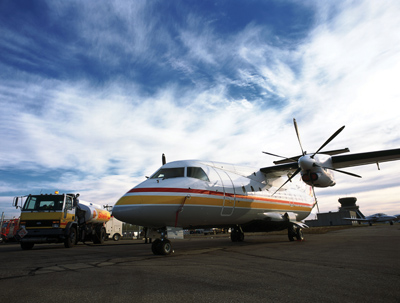
Features
Operations
Waypoint: Good is not good enough
You are buying fuel. This is a fairly normal activity for most, and a fact of life for anything that has an engine.
July 14, 2010 By Rob Seaman
You are buying fuel. This is a fairly normal activity for most, and a fact of life for anything that has an engine. We mindlessly fill up on a regular basis with little thought other than price and perhaps choice of brand. The price is just so darn awful. But we pay it anyway. We trust that what is going in is good, clean and trustworthy fuel. We trust the system and accept that all is good. And for the most part, that is a fair assumption.

|
|
| We can’t continue being the proverbial ostrich with our head in the sand . . . . This is real and the concern is global.
|
As meek and mild Canadians, we only complained when auto fuel hit 75 cents per litre. Then it went to 85 cents, so 75 cents didn’t seem so bad. Then from 85 cents it moved on until it reached our current rates – which can change depending on the day of week, the holiday that might be coming, and a whole bunch of other issues from hurricanes miles away, to international unrest in countries beyond. Despite what happens, we continue to buy and burn fuel.
For months now we’ve heard of various new fuel products undergoing testing for use in turbine-powered aircraft and more recently, for piston variants. We’ve been told repeatedly how bad we (the aviation community) are for the environment as a whole and that we need to change our Jet A1 and 100LL drinking habit. And I guess, like any addict, we are sitting back continuing our evil ways until someone really tells us what to do or presents a solid plan to change.
The General Aviation Manufacturers Association (GAMA) represents the interests of many of the international alphabet organizations and the OEMs from all walks of aviation. Its published stand on business aviation and climate change reads as follows: “The global business aviation operating and manufacturing communities support the International Civil Aviation Organization’s (ICAO) proposal for aviation sectoral management of targets and monitoring of greenhouse gas (GHG) emissions in a post-Kyoto Agreement. We support the ICAO Programme of Action on International Aviation and Climate Change and are in accord with the Declaration of the High Level Meeting on International Aviation and Climate Change convened by ICAO in Montreal on 7-9 October 2009.”
GAMA also notes that bizav is among the good guys in the environmental war. The organization puts it best: “Business Aviation has established an excellent record of consistently improving fuel efficiency, delivering 40 per cent improvement over the past 40 years. Business aviation’s global CO2 emissions are approximately 2 per cent of all aviation and 0.04 per cent of global man-made carbon emissions.”
But good is never good enough. So GAMA has committed to the following targets for our industry:
- carbon-neutral growth by 2020
- an improvement in fuel efficiency on average of two per cent per year from today until 2020
- a reduction in total CO2 emissions by 50 per cent by 2050 relative to 2005
As GAMA sees it, we’ll achieve these objectives through expected advances in four areas: technology, infrastructure and operational improvements, alternative fuels, and market-based measures.
Many will think, here we go again with more political rhetoric. Another group of folks I really don’t know are making decisions yet again that are going to affect and cost me in some form. Just when will others stop injecting themselves and their point of view into my world? I’ve done my bit. My car burns less gas. I recycle just about everything I can. And I changed all the light bulbs in my house to those ugly things they say I have to have. I really think I have done my part so please leave us aviation folks alone.
However, we can’t continue being the proverbial ostrich with our head in the sand, or worse, take the “not my issue” approach. This is real and the concern is global. We really need to start figuring out how to be a part of the solution as opposed to contributing to the problem.
Start by reading about alternative fuels and the discussion on biofuel, algae-based concepts and the replacements for 100LL. The U.S. Environmental Protection Agency (EPA) via the Clean Air Act is already working on standards mandating the transition to unleaded aviation gasoline (avgas). Fighting change in this case is not, in my opinion, the right thing to do. Learning about the issues and facts and gaining an understanding about alternatives and how to work with them is a better approach. Otherwise, you could be surprised and very unhappy about the changes.
Rob Seaman is a Wings writer and columnist.